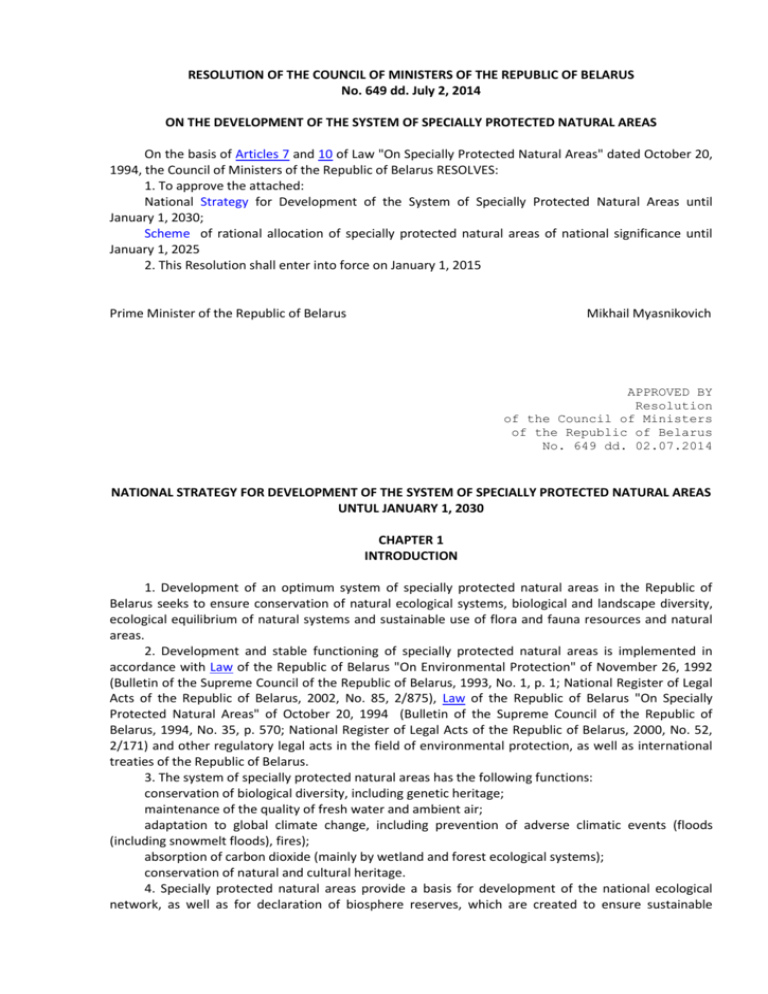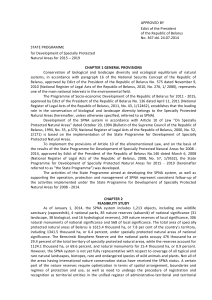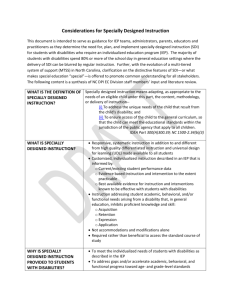national strategy for development of the system of specially
advertisement

RESOLUTION OF THE COUNCIL OF MINISTERS OF THE REPUBLIC OF BELARUS No. 649 dd. July 2, 2014 ON THE DEVELOPMENT OF THE SYSTEM OF SPECIALLY PROTECTED NATURAL AREAS On the basis of Articles 7 and 10 of Law "On Specially Protected Natural Areas" dated October 20, 1994, the Council of Ministers of the Republic of Belarus RESOLVES: 1. To approve the attached: National Strategy for Development of the System of Specially Protected Natural Areas until January 1, 2030; Scheme of rational allocation of specially protected natural areas of national significance until January 1, 2025 2. This Resolution shall enter into force on January 1, 2015 Prime Minister of the Republic of Belarus Mikhail Myasnikovich APPROVED BY Resolution of the Council of Ministers of the Republic of Belarus No. 649 dd. 02.07.2014 NATIONAL STRATEGY FOR DEVELOPMENT OF THE SYSTEM OF SPECIALLY PROTECTED NATURAL AREAS UNTUL JANUARY 1, 2030 CHAPTER 1 INTRODUCTION 1. Development of an optimum system of specially protected natural areas in the Republic of Belarus seeks to ensure conservation of natural ecological systems, biological and landscape diversity, ecological equilibrium of natural systems and sustainable use of flora and fauna resources and natural areas. 2. Development and stable functioning of specially protected natural areas is implemented in accordance with Law of the Republic of Belarus "On Environmental Protection" of November 26, 1992 (Bulletin of the Supreme Council of the Republic of Belarus, 1993, No. 1, p. 1; National Register of Legal Acts of the Republic of Belarus, 2002, No. 85, 2/875), Law of the Republic of Belarus "On Specially Protected Natural Areas" of October 20, 1994 (Bulletin of the Supreme Council of the Republic of Belarus, 1994, No. 35, p. 570; National Register of Legal Acts of the Republic of Belarus, 2000, No. 52, 2/171) and other regulatory legal acts in the field of environmental protection, as well as international treaties of the Republic of Belarus. 3. The system of specially protected natural areas has the following functions: conservation of biological diversity, including genetic heritage; maintenance of the quality of fresh water and ambient air; adaptation to global climate change, including prevention of adverse climatic events (floods (including snowmelt floods), fires); absorption of carbon dioxide (mainly by wetland and forest ecological systems); conservation of natural and cultural heritage. 4. Specially protected natural areas provide a basis for development of the national ecological network, as well as for declaration of biosphere reserves, which are created to ensure sustainable economic development of regions with due regard to environmentally sound utilization of natural resources and conservation of cultural heritage. 5. Development of a system of specially protected natural areas is a prerequisite for sustainable territorial development and environmental security of the country and is based on the scheme of rational allocation of specially protected natural areas of national significance and regional schemes for rational allocation of specially protected natural areas of local significance. The selection of natural areas for placement under special protection is based on the criteria as per Annex 1. 6. Public governance of specially protected natural areas is exercised by the President of the Republic of Belarus, the Council of Ministers, the Ministry of Natural Resources and Environmental Protection and its regional bodies, local executive and administrative bodies and other authorized state bodies within their mandate. CHAPTER 2 CURRENT STATUS OF THE SYSTEM OF SPECIALLY PROTECTED NATURAL AREAS 7. As of January 1, 2014, the system of specially protected natural areas of the Republic of Belarus includes 1,213 objects, including one wildlife sanctuary (zapovednik), 4 national parks, 85 nature reserves (zakaznik) of national significance (31 landscape, 38 biological, and 16 hydrological reserves), 249 nature reserves of local significance, 306 natural monuments of national significance and 568 of local significance. The total area of specially protected natural areas of Belarus is 1615.4 thousand ha, or 7.8 per cent of the country's territory, including 1341.5 thousand ha, or 6.4 percent, under specially protected natural areas of national significance. The Berezinski Biosphere Reserve and the national parks occupy 476 thousand ha or 29.4 percent of the total territory of specially protected natural areas, while the reserves account for 1124.1 thousand ha, or 69.6 percent, and natural monuments for 15.4 thousand ha, or 0.9 percent. 8. The structure of specially protected natural areas includes a variety of forest (about 58 percent), wetland (about 20 percent) and grassland ecosystems (about 17 percent) and inland water ecological systems - river valleys and lakes (about 5 percent). 9. Specially protected natural areas provide for preservation of natural equilibrium and genetic heritage and serve as centres for the reproduction of flora and fauna, along with limited and concerted utilization of other natural resources. Within the boundaries of specially protected natural areas there dwell about 80 percent of species of rare and endangered wild plants and about 90 percent of species of rare and endangered wild animals. Conservation of rare and endangered species of wild animals and plants is only possible subject to ensuring the protection of their habitats with due regard to climatic, geophysical and other conditions. In this context, conservation of habitat-forming species of wild animals and plants that shape the internal environment of an ecological system plays a particularly important role. 10. The specially protected natural areas with the most valuable natural complexes and objects, including the Berezinski Biosphere Reserves, national parks and 26 reserves of national significance, are managed by 31 state environmental agencies. 16 management plans have been developed for specially protected natural areas, including 1 for the Berezinski Biosphere Reserve, 4 - for national parks, 11 - for the reserves of national significance "Middle Pripyat", "Yelnya", "Osveyski", "Prostyr", "Zvanets", "Sporovski", "Lebyazhi","Volmyanski","Vygonoschanskoye","Krasny Bor", and "Pribuzhskoye Polesie". 11. In the specially protected natural areas with significant recreational resources, tourism and recreational activities have been actively developing. The list of specially protected natural areas considered attractive for tourism development is given in Annex 2 . The reserves "Vygonoschanskoye", "Sporovski", "Pribuzhskoye Polesie", "Middle Pripyat", "Krasny Bor", "Sinsha", and "Nalibokski" are included in the green routes network. Regulatory standards for permissible recreational loads have been calculated and approved for 29 specially protected natural areas. 12. The system of specially protected natural areas of the Republic of Belarus is recognized internationally. The Berezinski Biosphere Reserve, the National Park "Belovezhskaya Puscha" and the reserve of national significance "Pribuzhskoye Polesie" have the status of UNESCO Biosphere Reserve. On the basis of the Biosphere Reserve "Pribuzhskoye Polesie", there has been created a trilateral biosphere reserve "Western Polesie" (Belarus-Poland-Ukraine). Part of the National Park "Belovezhskaya Puscha" has been placed on the list of UNESCO World Heritage Sites; in addition to this, the National Park "Belovezhskaya Puscha" and the Berezinski Biosphere Reserve have been awarded European Diplomas for Protected Areas; 16 specially protected natural areas (Berezinski Biosphere Reserve, National Park "Pripyat" reserves "Sporovski", "Middle Pripyat", "Zvanets", "Olmanskiye Bolota", "Osveyski", "Yelnya", "Kotra", "Prostyr", "Vygonoschanskoye", "Morochno", "Stary Zhaden", "Ostrova Duleby - Zaozerye", "Kozyansky", "Vydritsa") have been included in the list of Wetlands of International Importance, 12 specially protected natural areas have been identified for inclusion in the European Emerald Network (Berezinski Biosphere Reserve, National Park “Belovezhskaya Puscha", "Braslav Lakes", "Pripyat", "Narochanski", reserves "Sporovski", "Middle Pripyat", "Yelnya", "Vygonoschanskoye", "Osveyski"," Olmanskiye Bolota"). CHAPTER 3 KEY CHALLENGES IN THE FUNCTIONING OF SPECIALLY PROTECTED NATURAL AREAS AND THEIR SOLUTIONS 13. It is necessary to complete the process of formation of the national ecological network and ensure its effective operation, in particular, through restoration of disturbed elements. 14. For the purpose of maintenance of the country's favourable environmental conditions, assurance of water inflow to lakes and rivers, conservation of rare and endangered species of wild animals and (or) wild plants, and development of eco-tourism, it is necessary to ensure conservation of natural or slightly modified wetland ecosystems. 15. Currently, the age composition of forests is dominated by middle-aged (45.4 percent of the forested areas) and young stands (27.5 percent), and old-growth forests have been preserved only in about 5 percent of the forest area; therefore, one of the main conditions for conservation of forest biodiversity is to preserve old-growth forest biotopes, including rare and endangered wild animals and (or) plants. 16. With respect to climate change, instances of natural hazards, such as droughts and hurricanes, have become more frequent, which leads to an increased risk of fires, higher occurrence of forest pests and diseases, and spread of invasive alien species of wild plants and animals. There continue intensive processes of the overgrowing of open meadows and fen bogs with trees and shrubs, the loss of which leads to disappearance of the associated plant and animal species, which requires regulation of economic activities in the area. 17. It is necessary to take action to limit the spring hunting in specially protected natural areas having the status of Wetlands of International Importance (reserves "Sporovski", "Middle Pripyat", "Zvanets", "Olmanskiye Bolota", "Osveyski" "Yelnya", "Kotra", "Prostyr", "Vygonoschanskoye", "Morochno", "Ostrova", "Zaozerye", "Kozyanski", "Vydritsa" and National Park "Pripyat"). 18. The average area of forests, where forest management restrictions and prohibitions have been established, does not exceed 15 percent of the forest area within the boundaries of specially protected natural areas. 591.5 thousand ha of forests located in specially protected natural areas (7.4 percent of all forests) have been excluded from the estimated final cuts. In the forests in specially protected natural areas, intermediate fellings and utilization of minor forest resources, as well as sanitation fellings and other types of fellings, should be carried out only following a differentiated approach. 19. At present, the recreational and tourism resources of nature reserves considered attractive for the development of tourism are underutilized. Local residents are still insufficient involved in the development of tourism in specially protected natural areas. Closer cooperation between state environmental agencies and professional tourism market actors is required. 20. Currently, in a number of reserves of national significance less than one third of the recreational potential is utilized, but in some areas the permissible recreational loads are exceeded 1.5 - 3 times. The problem of recreational overloads is particularly relevant for such reserves as "Svityaz" and “Ozery”. Unregulated recreational activities in specially protected natural areas, in some cases, have a negative impact on natural ecosystems, biological and landscape diversity. It is necessary to further control recreational loads and implement a "one style" approach in the development of touristic and green routes, including ecological trails. CHAPTER 4 PRINCIPLES, GOALS, OBJECTIVES AND PROSPECTIVE FOCUS AREAS IN THE DEVELOPMENT AND MANAGEMENT OF SPECIALLY PROTECTED NATURAL AREAS 21. The development and management of specially protected natural areas are based on the principles of representativeness, spatial integrity and scientific validity, priority of environmental interests over the economic ones, financial sustainability, responsibility, effective partnership and international cooperation. 22. This National Strategy is designed to establish a system of specially protected natural areas, which would be representative in relation to all typical and rare natural landscapes and habitats, ensure the balance of nature, preserve natural and near-natural ecological systems, biological and landscape diversity, and ensure sustainable use of its components at national and regional levels in the interests of the present and future generations, define the key perspective focus areas in the development and management of specially protected natural areas. 23. To achieve the objectives referred to in в paragraph 22 of this National Strategy, it is necessary to resolve the following problems: improve the legal, scientific and methodological support of sustainable operation of the system of specially protected natural areas and the national ecological network; ensure an effective system of protection of natural complexes and objects of specially protected natural areas; develop environmental outreach activities of state environmental agencies that manage the Berezinski Biosphere Reserve, the national parks, and the nature reserves of national significance; take account of the natural potential of specially protected natural areas (ecosystem services) in the regional development planning processes; enhance the role of specially protected natural areas in the development of a positive image of the region and the country as a whole. 24. Based on these principles, as well as on the goals and objectives set out in this National Strategy, the prospective focus areas in the development and management of specially protected natural areas are as follows: 24.1. optimization of the system of specially protected natural areas and its regional development in accordance with the scheme of rational allocation of specially protected natural areas of national significance and regional schemes of rational allocation of specially protected natural areas of local significance, as well as the scheme of the national ecological network; 24.2. creation of biosphere reserves, including transboundary ones, on the basis of the specially protected natural areas; 24.3. optimization of the management system of specially protected natural areas through the development and implementation of management plans for specially protected natural areas, including transboundary ones; 24.4. optimization of economic activities in specially protected natural areas based on balancing of the national and regional interests and the interests of local communities and land users; 24.5. optimization of conditions for the development of tourism in specially protected natural areas identified as attractive for the development of tourism, in particular, in the development and implementation of management plans for specially protected natural areas and special urban planning projects for resorts and recreation areas; 24.6. methodological support of research activities and enhancement of its effectiveness through developing and implementing long-term and short-term research Programmes, in particular, using remote diagnostics methods, geo-information technologies, automated control of the environmental situation, especially in the Berezinski Biosphere Reserve, national parks and reserves of international importance; 24.7. maintenance of a system for monitoring of the environment and ecological systems in specially protected natural areas by means of the creation of an information subsystem within the National Environmental Monitoring System in the Republic of Belarus to collect and process data acquired through complex monitoring of ecological systems in specially protected natural areas; use of the monitoring results to inform decision-making in the management of specially protected natural areas and optimization of their protection and use; 24.8. support of sustainable functioning of specially protected natural areas, their protection and use through the application of the results of environmental impact assessments of the decisions related to social and economic development and siting of construction projects, as well as through using the methods of valuation of natural resources in specially protected natural areas; intensification of activities to attract investments into the development of the system of specially protected natural areas; 24.9. raising of the awareness of local communities and residents about the importance and benefits of specially protected natural areas, facilitation of their involvement in the management of specially protected natural areas, promotion of elements of folk culture and traditions, maintenance of environmental centres and museums, development of cooperation between state environmental agencies and educational institutions; 24.10. intensification and strengthening of international cooperation in the field of specially protected natural areas through the integration of the national ecological network in the Pan-European Ecological Network, primarily through the creation of transboundary protected natural areas and biosphere reserves. CHAPTER 5 MECHANISM AND EXPECTED RESULTS OF THE IMPLEMENTATION OF THIS NATIONAL STRATEGY 25. In order to implement the tasks and achieve the objectives set out in this National Strategy, efforts are taken to develop and implement state Programmes for development of the system of specially protected natural areas, the national ecological network scheme, the scheme of rational allocation of specially protected natural areas of national significance and regional schemes of rational allocation of specially protected natural areas of local significance. In the development of the documents referred to in the second part of Article 63 of Law "On Environmental Protection", due regard is paid to the scheme of rational allocation of specially protected natural areas of national significance and regional schemes of rational allocation of specially protected natural areas of local significance. 26. The implementation of this National Strategy will be based on partnership and cooperation of central government bodies, local executive and administrative bodies, research institutions and other organizations, as well as a clear delineation of their powers and responsibilities. 27. Implementation of this National Strategy will allow for achieving: 27.1. complete and systemic legal regulation of social relations in the field of protection and use of specially protected natural areas; 27.2. completion of the formation of the national ecological network, including the optimization of its spatial structure, restoration of disturbed elements that will ensure reliable functional links between specially protected natural areas, free migration of wild animals and the continuity of their habitats; 27.3. integration of the national ecological network with the ecological networks of neighbouring countries and the Pan-European Ecological Network, in particular, through the creation of transboundary specially protected natural areas and biosphere reserves; 27.4. achievement of the objective of expanding the territory of specially protected natural areas to at least 8.3 percent of the country's territory by 2030. The system of specially protected natural areas will be fully representative in terms of covering all typical and rare natural landscapes and habitats. All of the specially protected natural areas will be included in the register of specially protected natural areas of the Republic of Belarus and recorded in a single register of administrative-territorial and territorial entities of the Republic of Belarus; 27.5. management of specially protected natural areas of international significance on the basis of management plans; 27.6. management of the Berezinski Biosphere Reserve, the national parks and other specially protected natural areas of international significance with the use of GIS and remote diagnosis methods; 27.7. restoration of disturbed ecosystems of floodplain meadows and wetlands through the organization of sustainable utilization of shrubs and reeds in specially protected natural areas. With the use of modern technology and equipment, about 3.5 thousand ha of fen bogs will be cleaned from shrubs and reeds and about 1.5 thousand tons of dry biomass will be produced. Emissions in the amount of 15.6 tCO2-eq/ha/year will be prevented through replacing fossil fuels with plant biomass from peat bogs; 27.8. restoration of degraded peatbogs, which will prevent peat fires and reduce air emissions of carbon dioxide; 27.9. sustainable use of natural resources and other resources available in specially protected natural areas; 27.10. increase in the number of tourists visiting specially protected natural areas by at least 80 percent due to the development of tourism infrastructure and informational support of its operation. At least 500 new jobs will be created in rural areas and small towns. At least 20 nature reserves of national significance will be included in the network of green routes. Popular tourism activities, such as bird watching, botanical and scientific tourism will be developed; 27.11. implementation of tourism activities in the specially protected natural areas on the basis of science-based standards for permissible anthropogenic loads and management plans. The implemented optimization and corrective measures will mitigate the adverse impacts of recreational pressures to the environmentally acceptable parameters; 27.12. effective operation of a representative system of integrated monitoring of ecological systems in specially protected natural areas; 27.13. increased level of education and awareness of the local residents and the general public in the field of specially protected natural areas. Information on specially protected natural areas will be available in the Internet and published in the mass media. Decisions concerning specially protected natural areas will be made with due regard to the public opinion; 27.14. fulfilment by the Republic of Belarus of its obligations under international treaties in the field of conservation of biological and landscape diversity and natural heritage. Transboundary protected natural areas will be created, including "Vileity-Adutiškis", "Richi - Silene", "Olmanskiye Bolota - Perebrody", "Kotra - Čepkeliai" and transboundary biosphere reserves, including "Pripyat Polesie". No less than three specially protected natural areas will be given international status. Annex 1 to the National Strategy for Development of the System of Specially Protected Natural Areas until January 1, 2030 SELECTION CRITERIA FOR PLACEMENT OF NATURAL AREAS UNDER SPECIAL PROTECTION <*> -------------------------------<*> The status of natural area, which is declared a specially protected area (reserve, natural monument) is determined on the basis of the natural value of natural areas on the national or local scale. A natural area is considered potentially eligible for special protection status if it meets several of the listed criteria. When selecting natural areas for declaring them specially protected, the following criteria apply: presence of habitats of rare and endangered species of wild animals and plants included in the Red Data Book of the Republic of Belarus, and species covered by international treaties of the Republic of Belarus; presence of regular breeding or wintering grounds and migration stopover sites of wetland and other species of migratory birds in the numbers exceeding 1 percent of the total national or European population of the species; presence of annual concentration sites during seasonal migrations gathering at least 10 000 individual migratory wetland birds (waders, ducks, geese), or more than 500 individual grey cranes; presence of spawning, feeding and migration grounds of fish species listed in the Red Data Book of the Republic of Belarus; presence of natural areas, which are elements of the national ecological network. To assign to a natural area a wildlife sanctuary status, the following criteria will additionally apply: typical and (or) rare natural landscapes and biotopes make up 80 percent or more of the territory of the natural area; presence of habitats of 50 or more species of wild animals and (or) plants included in the Red Data Book of the Republic of Belarus, and (or) species covered by the international treaties of the Republic of Belarus; minimum degree of anthropogenic transformation of the area. To assign to natural areas a national park status, the following criteria will additionally apply: typical and (or) rare natural landscapes and habitats make up 60 percent or more of the territory of natural areas; presence of habitats of 30 or more species of wild animals and (or) plants included in the Red Data Book of the Republic of Belarus, and (or) species covered by the international treaties of the Republic of Belarus; availability of recreational potential, aesthetic, balneological and other valuable properties of natural complexes and objects. To assign to natural areas a nature reserve status, the following criteria will additionally apply: typical and (or) rare natural landscapes and habitats make up 50 percent or more of the territory of natural areas; presence of habitats of 10 or more species of wild animals and (or) plants included in the Red Data Book of the Republic of Belarus, and (or) species covered by the international treaties of the Republic of Belarus; availability of recreational potential, aesthetic, balneological and other valuable properties of natural complexes and objects. Assigning to natural areas a natural monument status is subject to additional application of the criterion of availability of environmental, scientific and (or) aesthetic and other properties of natural complexes and objects (botanical gardens, arboretums, forest sites with valuable tree species, individual century-old trees or rare species of trees, or groups of such trees, sites with relic or particularly valuable vegetation, small water bodies, outcrops of glacial deposits and bedrock, large boulders and their clusters and other similar natural complexes and objects). Annex 2 National Strategy for Development of the System of Specially Protected Natural Areas until January 1, 2030 List Specially protected territories perspective for ecotourism development 1. National park “Belovezhckaya pushcha”. 2. National park "Braslavskie ozera". 3. National park "Narochanskii”. 4. National park "Pripyatskii". 5. Republican landscape reserve "Pribuzhskoe Polesie". 6. Republican landscape reserve "Stronga". 7. Republican biological reserve "Zvanets". 8. Republican biological reserve "Ruzhanskaya pushcha ". 9. Republican biological reserve "Luninskii". 10. Republican landscape reserve "Srednya Pripyat ". 11. Republican landscape reserve "Prostyr". 12. Republican landscape reserve "Olmanskie bolota ". 13. Republican biological reserve "Sporovskii". 14. Republican landscape reserve "Vygonoschanskoe". 15. Republican landscape reserve "Sinsha". 16. Republican landscape reserve "Krasnyii Bor ". 17. Republican landscape reserve "Kozyanskii". 18. Republican landscape reserve "Osvejskii". 19. Republican landscape reserve "Elnya". 20. Republican hydrological reserve "Dolgoe". 21. Republican hydrological reserve "Korytenskii Mokh ". 22. Republican hydrological reserve "Shavkshty". 23. Republican landscape reserve "Grodnenskya pushcha". 24. Republican landscape reserve "Svityazanskii". 25. Republican landscape reserve "Ozery". 26. Republican landscape reserve "Lipichanskaya pushcha". 27. Republican landscape reserve "Kotra". 28. Republican landscape reserve "Sorochanskie ozera". 29. Republican landscape reserve "Smychok". 30. Republican landscape reserve "Vydritsa". 31. Republican biological reserve "Dnepro-Sozhskii. 32. Republican landscape reserve "Mozyrskie ovragi ". 33. Republican landscape reserve "Selyava". 34. Republican landscape reserve "Kupalovskii". 35. Republican landscape reserve "Naliboksii". 36. Republican biological reserve "Volmyanskii". 37. Republican biological reserve "Lebiazhyi". 38. Republican biological reserve "Chernevskii". 39. Republican hydrological reserve "Ostrova Duleby ". APPROVED resolution the Council of Ministers the Republic of Belarus 02.07.2014 N 649 Scheme of rational allocation of protected areas, having republican significance, up to January 1 2025. 1. Berezinski biosphere reserve and National Parks Name of protected area 1.Berezinski biosphere reserve Location (regions, districts) Vitebsk region, Lepel and Dokshitsy districts Actions for development of system of specially protected territories - Terms (years) - Area of specially protected territories as of January 1 2015. (ha) Planned area of specially protected territories as of January 1 2026 (ha) <*> Total Divided by regions Total Divided by regions 85 192 66 241 85 192 66 241 Minsk region, Borisov district 18 951 18 951 National parks 2.Belovezhkskaya pushcha Brest region, Kamenets, Prushany districts - - 150 069 Grodno region, Svisloch district 86 318 150 069 63 751 86 318 63 751 3.Braslavskie ozera Vitebsk region, Braslav district - - 64 493 64 493 64 493 64 493 4. Narochanski Minsk region, Myadel, - - 87 660 86 384 87 660 86 384 Vileika distrcts Grodno region, Smorgon district 218 218 Vitebsk region, Postavy district 1 058 1 058 5. Pripyatski Gomel region, Zhitkovichi, Leltchitsy, Petrikov districts 6. SvislochskoBerezinski Mogilev region, Klichev, Osipovichi districts - Transformation from reserve of republican importance - 88 553 88 553 88 553 88 553 2019 - 2020 - - 17 480 17 480 390 775 390 775 408 255 408 255 Totally on national parks 2. Reserves of republican importance Name of specially protected territory Location (distrcits) Type of reserve Actions for development of system of specially protected territories Terms (years) Area of specially Planned area of protected specially protected territories as of territories as of January 1 2015. January 1 2026 (ha) (ha) <*> Brest region 7. Borski Gantsevichi, Luninets 8. Buslovka Bereza, Prushany 9. Vygonoshanskoe <**> Ivatsevichi, Biological " Landscape transformation - - 2 818 2 818 2016 - 2017 7 936 about 7 940 - 54 611 54 611 Lyakhovichi, Gantsevichi 10. Elovskii Gantsevichi Biological - - 959 959 11. Zvanets Drogichin Landscape - - 16 227 16 227 12. Lukovo Malorita Biological - - 1 594 1 594 13. Luninskii Luninets 2019 - 2020 9 283 9 280 14. Morochno Stolin 15. Olmanskie bolota " " Transformation Wetlands " 2015 5 283 6 416 Landscape " 2019 - 2020 94 219 94 200 - - 10 647 10 647 2016 - 2017 7 950 16 000 16. Podveliki mokh Gantevichi Hydrological 17. Pribuzhskoe Polesie Brest Landscape 18. Prostyr Pinsk " - - 9 545 9 545 19. Radostovskii Drogichin " - - 6 685 6 685 20. Ruzhanskaya pushcha Pruszhany - - 2 812 2 812 21. Sporovskii Bereza, Drogichin, Ivanovo, Ivatsevichi - - 19 384 19 384 22. Srednya Pripyat Pinsk, Luninets, Stolin (part of the reserve located in Gomel region) - - 70 692 (total area of the reserve 93 062) 70 692 (total area of the reserve 93 062) 23. Stronga Baranovichi 2022 - 2023 12 015 13 000 Transformation Biological " ландшафтный " Transformation 24. Tyrvovivhi Pinsk Biological - - 1 391 1 391 328 768 344 201 2018 - 2019 10 547 about 10 550 Totally Vitebsk region 25. Babinovichkii Liozno Landscape Transformation 26. Beloe Glubokoe Hydrological - - 483 483 27. Boloto Mokh Myory " - - 4 602 4 602 28. Verhnevileiskii Dokshitsy " - - 815 815 29. Glubokoe – Bolshoe Ostrovito Polotsk " - - 1 353 1 353 30. Dolgoe Glubokoe " - - 644 644 31. Drozhbitka-Svina <**> Polotsk Wetlands - - 6 727 6 727 32. Elnya Myory, Sharkovschina Landscape - - 25 301 25 301 33. Zhada Myory Wetlands 2015 - 7 072 34. Zapolskii Vitebsk Biological - 794 794 35. Kozyanskii Polotsk Landscape 2018 - 2019 26 060 26 100 36. Korytenskii Mokh Gorogok Hydrological " 2019 - 2020 1 389 1 389 37. Krasnyii Bor Rossony, Verhnedvinsk Landscape " 2016 - 2017 34 231 35 450 38. Krivoe Ushachi Hydrological - - 1 064 1 064 Announcement Transformation 39. Lonno Polotsk Biological - - 443 443 40. Moshno Vitebsk - - 399 399 41. Osveiskii <**> Vehnedvinsk Landscape - - 30 567 30 567 42. Pichi Bralsav Hydrological - - 1 391 1 391 43. Servech Dokshitsy, Glubokoe 2016 - 2017 9 068 9 070 44. Sinsha <**> Rossony Landscape - - 12 877 12 877 45. Sosno Shumilino Hydrological - - 168 168 46. Spory Postavy 2015 - 1 000 47. Chistik Vitebsk Biological - - 300 300 48. Shvakshty <**> Postavy Hydrological - - 5 517 5 517 49. Yanka <**> Sharkovshchina Wetlands - - 5 848 5 848 180 588 189 924 " " " Transformation Announcement Totally Gomel region 50. Babinets Oktyabrsk Biological 51. Buda-Koshelevskii Buda-Koshelevo 52. Bukchanskii Lelchitsy 53. Vydritsa Zhlobin, Svetlogorsk Landscape 54. Dnepro-Sozhskii Loev Biological - - 831 831 " - - 6 721 6 721 " - - 4 990 4 990 17 560 17 560 14 556 14 556 Transformation - 2022 - 2023 - 55. Mozyrskie ovragi Mozyr Landscape - - 1 020 1 020 56. Oktyabrskii Oktyabrsk Biological - - 4 070 4 070 57. Poima reki Sozh <**> Vetka, Chechersk, Buda- Wetlands Koshelevo - - 8 564 8 564 58. Smychok Zhlobin,Rechitsa - - 2 635 2 635 59. Srednya Pripyat Zhitkovichi (part of the reserve located in Brest region) - - 22 370 (total area of the reserve 93 062) 22 370 (total area of the reserve 93 062) 60. Stary Zhaden <**> Zhitkovichi Wetlands - - 17 048 17 048 61. Strelskii Kalinkovichi, Mozyr Landscape 12 161 12 200 62. Chirkovichckii Svetlogorsk Biological 462 462 112 988 113 027 2015 - 800 Landscape " Transformation - 2018 - 2019 - Totally Гродненская область 63. Belyi Mokh Ostovets Wetlands 64. Grodnenskaya pushcha Grodno Landscape - - 20 516 20 516 65. Dokudovskii <**> Lida Biological - - 630 630 66. Dubatovskoe Smorgon " - - 840 840 67. Zamkovyi les Volovysk " - - 3 662 3 662 68. Kotra Schuchin - - 10 464 10 464 Landscape Announcement 69. Lipichanskaya pushcha Dyatlovo, Mosty , Schuchin " 70. Medukhovo Zelva Biological 71. Miranka <**> Korelichi Hydrological 72. Nalibokskii Ivievo, Novogrudok (part Landscape of the reserve located in Minsk region) 73. Novogrudskii <**> Novogrudok 74. Ozery Transformation 2020 - 2021 15 153 15 150 - - 1 375 1 375 - - 3 549 3 549 - - 27 684 (total area of the reserve 86 892) 27 684 (total area of the reserve 86 892) " - - 1 827 1 827 Grodno, Schuchin " - - 23 458 23 458 75. Sorochanskie ozera Ostrovets " - - 14 739 14 739 76. Svityazanskii Novogrudok " - - 1 194 1 194 77. Slonimskii Slonim - - 4 813 4 813 129 904 130 701 Biological Totally Minsk region 78. Belaya Rus <**> Logoisk 79. Borisovskii <**> Borisov, Smolevichi 80. Volmyanskii Smolevichi 81. Voronichkii ostrov <**> 82. Gaino-Brodnya <**> Landscape - - 4 460 4 460 - - 2 731 2 731 Biological - - 615 615 Pukhovichi Wetlands - - 828 828 Smolevichi Hydrological - - 1 201 1 201 " 83. Glebovka Minsk 84. Denisovskii Krupki 85. Kopysh Pukhovichi 86. Kupalovskii Logoisk, Minsk 87. Matsevichskoe Pukhovichi 88. Nalibokskii Biological - - 964 964 " - - 3 051 3 051 " - - 1 222 1 222 Landscape - 2022 - 2023 3 834 3 840 Biological - - 1 802 1 802 Volozhin,Stolbtsy (part Landscape of the reserve located in Grodno region) - - 59 208 (total area of the reserve 86 892) 59 208 (total area of the reserve 86 892) 89. Omgovichskii Slutsk, Staye Dorogi - - 2 557 2 557 90. Omelnyanskii Pukhovichi " - - 2 012 2 012 91. Pekalinskii Smolevichi " - - 2 129 2 129 92. Podsady Minsk " - 2021 - 2022 1 079 1 080 Biological 93. Prilepskii " Landscape - - 3 242 3 242 94. Prilukskii " Biological - - 523 523 95. Selyava <**> Krupki (part of the reserve located in Vitebsk region) Landscape - - 19 365 19 365 96. Stiklevo <**> Minsk биологический - - 412 412 Landscape - - 797 797 2017 - 2018 1 947 1 950 97. Treskovschina <**> 98. Falichskii Mokh " Starye Dorogi Biological Transformation 99. Chernevichskii Berezino,Borisov, Krupki Landscape - - 10 180 10 180 100. Chernevskii Borisov - - 1 026 1 026 101. Yukhnovskii Minsk - - 221 221 125 406 125 416 Biological " Totally Mogilev region 102. Zaozerie Belynichi 103. Ostova Dyleby Belynichi,Klichev 104. SvislochskoBerezinski <**> Klichev,Osipovichi 105. Staritsa Bykhov Hydrological " Landscape " - - 4 172 4 172 26 600 Transformation 2023 - 2024 26 600 Transformation into national park 2019 - 2020 17 480 Transformation 2021 - 2022 2 033 2 033 50 285 32 805 Totally - Minsk city 106. Lebyazhyi Minsk Biological Totally on reserves of Republican importance Totally on specially protected territories - - 43 43 927 982 936 117 1 403 949 1 429 564 -------------------------------<*> Areas may be changed under preparation of announcement on establishment and transformation of specially protected territories. <**> Announcing, transformation of specially protected natural territories in 2014 prescribed in accordance with the Scheme of rational allocation of specially protected natural territories of republican importance until January 1, 2015, approved by Decision of Council of Ministers dated Dec 29, 2007 N 1919.







